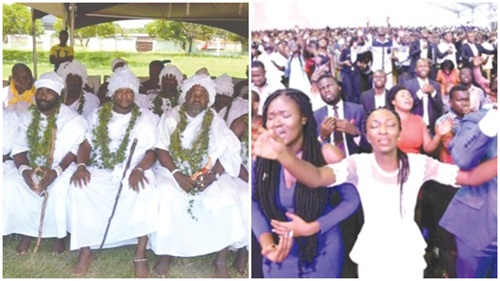Constitutionally guaranteed religious freedom is central to Ghana’s reputation for religious tolerance, although there are recent instances of linked challenges and tensions.
They include the inclusion of religious and moral education in public schools, restrictions on public gatherings during the COVID-19 pandemic and ongoing discussions about the projected national Christian cathedral.
Article 21 of Ghana’s Constitution states that “all persons shall have the right to freedom to practice any religion and to manifest such practice”.
This seems clear: nothing shall prevent me from expressing my religious beliefs in any way I see fit, that is, “to manifest [religious] practice”.
Restrictions
But what if my religious belief includes a belief, for example, that it is appropriate to sacrifice virgins or demand money from people with menaces?
Should the state allow this to happen in the name of religious freedom? Most of us would say ‘no’, such actions are not allowable.
During the 2020-22 COVID-19 pandemic, Ghana’s government, like many others around the world, restricted religious practices, including group meetings for community worship.
The reason was that the risk of transmitting the disease to others would be significantly heightened if people met and mingled during religious services.
Today, the issue of religious freedom is in the news. The Ghana Pentecostal and Charismatic Council (GPCC) has expressed concern and displeasure over the enforcement of a noise-making ban in parts of Greater Accra by a task force of the Ga Traditional Council.
Noise-making
The Ga Traditional Council seeks annually to implement a ban on noise-making from 12 May to 12 June in the run-up to the Homowo Festival, which will be held this year from August 1-15. The ban restricts loud public activities such as drumming, clapping and using loudspeakers, including outside church premises.
Singing is, however, allowed and soChristians can sing their hymns.
The aim of the annual ban, a significant cultural practice among the Ga people of Greater Accra, is to create an atmosphere of peace, solemnity and spiritual reflection. The Homowo Festival celebrates unity, resilience and gratitude for a bountiful harvest.
The GPCC is one of Ghana’s largest and most influential Christian umbrella organisations, with an estimated 270 member churches.
According to the GPCC website, “every member church fully engage[s] in fulfilling the Great Commission of our Lord Jesus Christ.
The GPCC is guided by a deep commitment to promoting Christian unity, cooperation and spiritual growth.”
Cultural clash
The President of GPCC, televangelist and the sixth Chairman of Ghana’s largest church, the Church of Pentecost, Apostle Eric Nyamekye, recently affirmed that the GPCC recognises and respects the Ga people’s cultural heritage, customs and traditions.
Apostle Nyamekye confirmed that the GPCC’s respect extends to the annual observation of the ban on noise as part of the Homowo Festival.
At the same time, the GPCC is “disturbed” by “increasing reports of intimidation, harassment and in some cases, the unlawful entry, assault and disruption of church services by certain individuals purporting to be members of the [Ga Traditional Area] task force.”
On the face of it, this appears to be a clear case of denial of a constitutionally specified religious freedom: “intimidation, harassment and in some cases, the unlawful entry, assault and disruption of church services”.
A cultural clash is fuelling the conflict: On the one hand, there is “the cultural heritage, customs and traditions of the Ga people, especially the annual observation of the ban [on excessive noise] as part of the Homowo Festival”.
On the other hand, there is the asserted religious right of churches to drum, clap, use loudspeakers and more generally indulge in “noise-making”.
Summons
Fifteen churches, including the Lighthouse Chapel and the Calvary Baptist Church, have been summoned for violating the noise-making ban. According to Asafoatse Mankatta, the leader of the Ga Traditional Area taskforce seeking to enforce the month-long directive, members of the 15 churches were found to be clapping during their services—a direct breach of the traditional council’s rules.
According to Mr Mankatta, some of the accused churches refused to accept their summons letters.
He added, “We have great respect for the Calvary Baptist Church, but we were surprised to see them flouting the orders of the traditional council.
They were making noise as if nothing was at stake.”
Ghanaians who are not Ga, not members of a GPCC church or don’t live in Accra, might regard the controversy over noise-making during the build-up to the Homowo Festival as a storm in a teacup.
How, then, does the imbroglio matter when it comes to the issue of religious freedom in Ghana?
To understand the importance of the issue, we might refer to a key aim of all 270 GPCC member churches: “fulfilling the Great Commission of our Lord Jesus Christ.”
This refers to the goal of evangelising Ghana, that is, converting Ghanaians en masse to Christianity.
The ultimate goal of the Great Commission is the Christianisation of Ghana. Ga traditional beliefs do not necessarily sit well in the GPCC’s vision of a Christianised Ghana.
Noise-making during the Homowo festival is not a trivial issue: it is representative of more general tensions between traditional cultures and religious freedom in Ghana.
The traditional cultural rights of the Ga people, long-time occupiers of the land from whence sprang today’s megacity of Accra, do not necessarily sit easily with the religious freedom ofGreater Accra’s 200+ pentecostal-charismatic churches.
The Ministry of Local Government, Chieftaincy and Religious Affairs may need to get involved to sort things out.
The writer is Emeritus Professor of Politics, London Metropolitan University, UK

